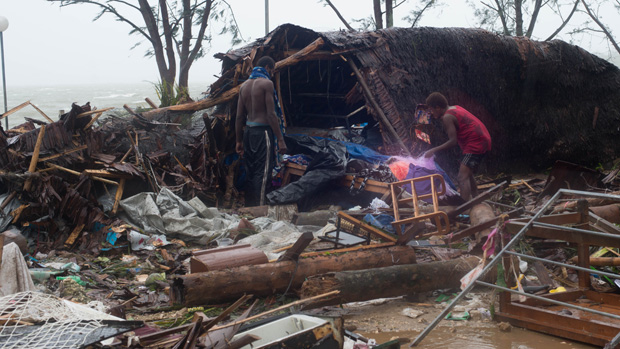Cyclone Pam: 'apocalyptic' levels of destruction in Vanuatu
Vanuatu's president says climate change is to blame for the increase in cyclones and extreme weather

A free daily email with the biggest news stories of the day – and the best features from TheWeek.com
You are now subscribed
Your newsletter sign-up was successful
Emergency aid and relief supplies have begun to arrive in Vanuatu, the small Pacific island nation devastated by the ravages of tropical cyclone Pam this weekend.
The category five storm is one of the worst natural disasters to have ever hit the region, with aid agencies describing the devastation as "apocalyptic". Winds of up to 200mph destroyed homes, roads and bridges and brought down phone and power lines.
"Virtually every building that is not concrete has been flattened," a member of the Red Cross team told Sky news Australia.
The Week
Escape your echo chamber. Get the facts behind the news, plus analysis from multiple perspectives.

Sign up for The Week's Free Newsletters
From our morning news briefing to a weekly Good News Newsletter, get the best of The Week delivered directly to your inbox.
From our morning news briefing to a weekly Good News Newsletter, get the best of The Week delivered directly to your inbox.
The official death toll in Vanuatu stands at eight, but aid agencies fear the number could rise significantly as rescue teams finally reach the country's outlying islands.
Vanuatu's president said the "monster" cyclone had "wiped out" the country's development. Baldwin Lonsdale, who happened to be in Japan at a disaster risk conference when the storm struck, made a tearful appeal for aid and assistance from the international community.
Although emergency supplies have begun to arrive in Vanuatu’s capital, Port Vila, aid agencies warn that it may take days to reach the remote villages across the archipelago's 80 islands. Thousands of people are now homeless as a result of the storm.
Lonsdale says climate change has contributed to changing weather patterns in the region, sea level rise and an increase in the prevalence of cyclones. "This year we have more [cyclones] than in any year. Yes, climate change is contributing to this," he said.
A free daily email with the biggest news stories of the day – and the best features from TheWeek.com
The president of Kiribati, another Pacific island nation affected by Pam, said it was time for international leaders to "match the rhetoric" and take urgent action to combat the effects of climate change, according to The Guardian.
"For leaders of low-lying island atolls, the hazards of global warming affect our people in different ways, and it is a catastrophe that impinges on our rights … and our survival into the future," said Anote Tong.
-
 6 exquisite homes with vast acreage
6 exquisite homes with vast acreageFeature Featuring an off-the-grid contemporary home in New Mexico and lakefront farmhouse in Massachusetts
-
 Film reviews: ‘Wuthering Heights,’ ‘Good Luck, Have Fun, Don’t Die,’ and ‘Sirat’
Film reviews: ‘Wuthering Heights,’ ‘Good Luck, Have Fun, Don’t Die,’ and ‘Sirat’Feature An inconvenient love torments a would-be couple, a gonzo time traveler seeks to save humanity from AI, and a father’s desperate search goes deeply sideways
-
 Political cartoons for February 16
Political cartoons for February 16Cartoons Monday’s political cartoons include President's Day, a valentine from the Epstein files, and more
-
 Epstein files topple law CEO, roil UK government
Epstein files topple law CEO, roil UK governmentSpeed Read Peter Mandelson, Britain’s former ambassador to the US, is caught up in the scandal
-
 Iran and US prepare to meet after skirmishes
Iran and US prepare to meet after skirmishesSpeed Read The incident comes amid heightened tensions in the Middle East
-
 Israel retrieves final hostage’s body from Gaza
Israel retrieves final hostage’s body from GazaSpeed Read The 24-year-old police officer was killed during the initial Hamas attack
-
 China’s Xi targets top general in growing purge
China’s Xi targets top general in growing purgeSpeed Read Zhang Youxia is being investigated over ‘grave violations’ of the law
-
 Panama and Canada are negotiating over a crucial copper mine
Panama and Canada are negotiating over a crucial copper mineIn the Spotlight Panama is set to make a final decision on the mine this summer
-
 Why Greenland’s natural resources are nearly impossible to mine
Why Greenland’s natural resources are nearly impossible to mineThe Explainer The country’s natural landscape makes the task extremely difficult
-
 Iran cuts internet as protests escalate
Iran cuts internet as protests escalateSpeed Reada Government buildings across the country have been set on fire
-
 US nabs ‘shadow’ tanker claimed by Russia
US nabs ‘shadow’ tanker claimed by RussiaSpeed Read The ship was one of two vessels seized by the US military